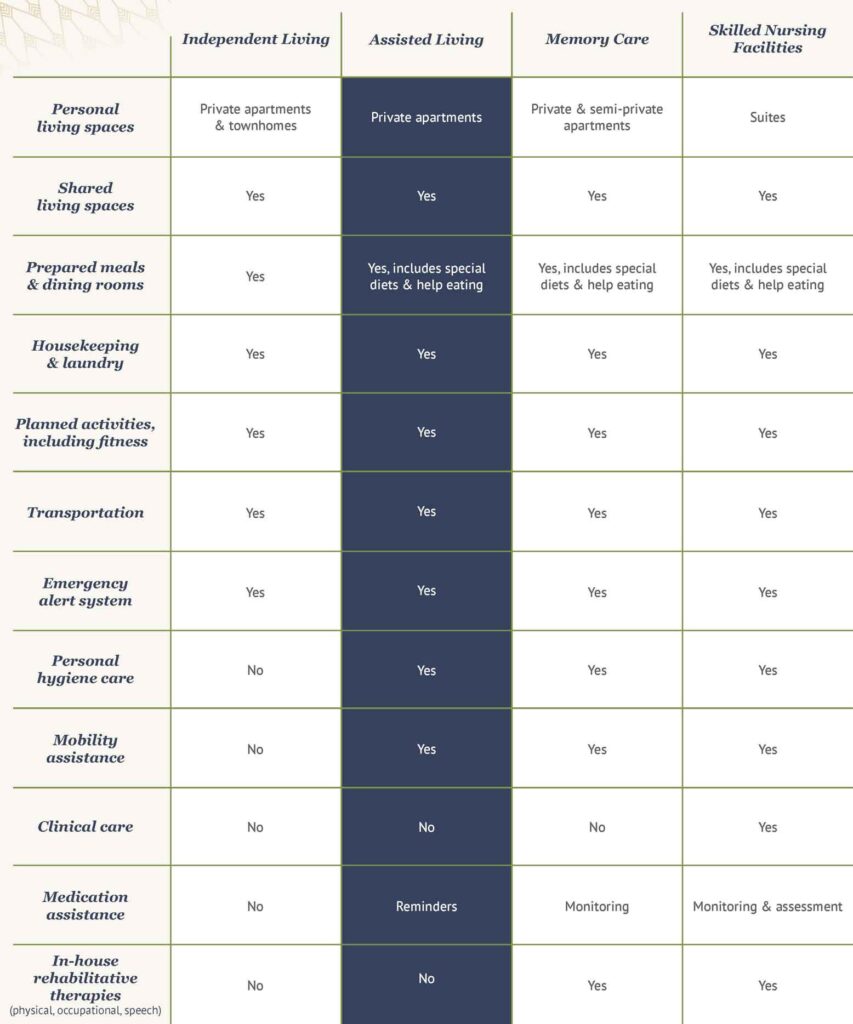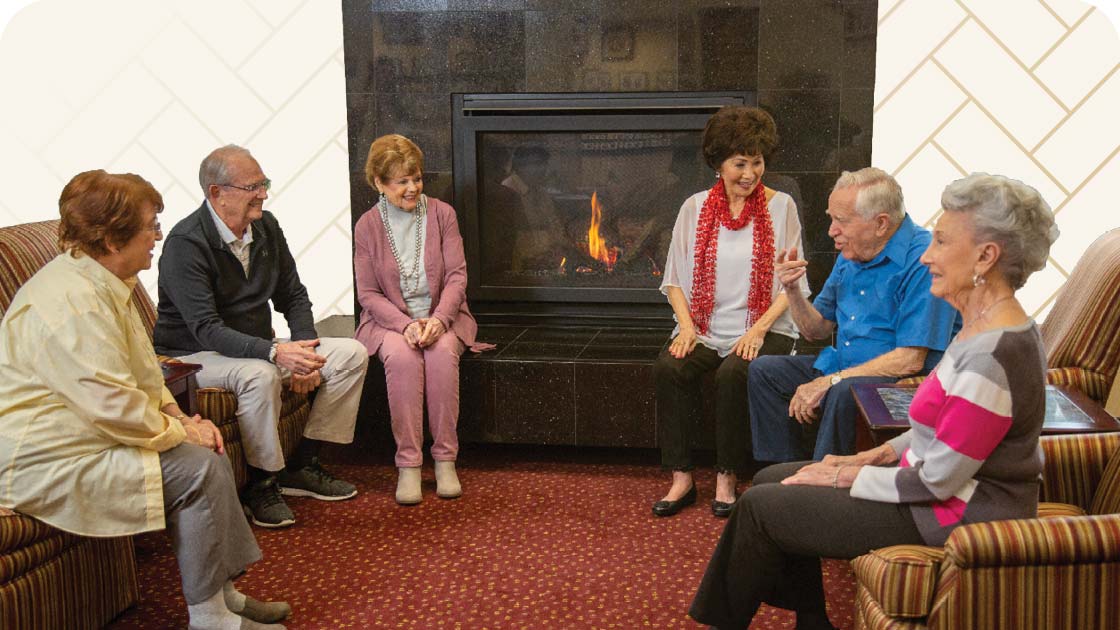Is it Time to Make the Move to an Assisted Living Community?
As adults get older, it’s important to acknowledge and address changing health care needs. Assisted living is a popular senior care option that strikes the perfect balance between independence and support. However, families often delay making a decision to move until a crisis occurs. As a result, people are forced to make decisions under pressure.
If you’ve witnessed yourself or a loved one face physical hurdles with day-to-day tasks, like cooking, cleaning, or even bathing, it might be time for a positive transformation. Start exploring residential assisted living, and you’ll discover that older adults in these residences can still enjoy an engaging, active lifestyle.
In this comprehensive blog, we will delve into the essence of assisted living, exploring the diverse range of services it offers and understanding the financial considerations involved. Armed with this knowledge, you can make a well-informed decision that ensures you or your loved one thrive in a nurturing and compassionate environment.
Statement of Fairness: Considering senior living options for yourself or a loved one? We’re here to help at every step. And even though we specialize in independent living communities, our goal is for YOU to find your best path to gracious retirement living, and part of how we achieve that is by providing reliable information on all types of senior living, not just the ones we offer. When our offerings serve as useful illustrations to a specific topic, you can find that information in the attached sidebar.
What is Residential Assisted Living for Seniors?
Assisted living is a specialized residential option that bridges the gap between independent living and round-the-clock care. It is designed for seniors who require some level of assistance with daily activities, such as bathing, dressing and medication management. These communities provide a safe and supportive environment, ensuring that residents receive the personalized care they need while preserving their dignity and autonomy. Residents are encouraged to live as independently as possible and participate in engaging social and physical activities.
What is an Assisted Living Residence?
If you haven’t visited an assisted living community before, you may be in for a pleasant surprise. Shared living spaces feature places to socialize, dining rooms, libraries, gardens, cafés, beauty salons and more. Round-the-clock trained staff are on hand to care for their residents’ physical an emotional needs.
At What Age Do Most Older Adults Move to Residential Assisted Living?
Four out of five older adults endure at least one chronic condition, such as diabetes, high blood pressure, heart disease or depression. Almost 60% of them will need some form of long-term care. Although the average assisted living resident is 85 or older, there’s no magic number.
Because people are changing their views about senior living, older adults are starting to enter at a younger age. Gone are the days when independent living and assisted living residences were perceived as dreary, last-resort options for older adults.
Today, these vibrant communities have become hubs of vibrant activity, fostering friendships, promoting well-being and offering a remarkably high quality of life. From resort-style residences to cozy, intimate homes, the array of choices caters to diverse preferences, ensuring older adults find the perfect setting that aligns with their lifestyle and needs.
Is My Loved One a Good Candidate for Assisted Living?
Assisted living senior housing is ideal for older adults and individuals who:
- Still want to experience a socially active lifestyle
- Desire to stay independent despite chronic health conditions
- Are unable to maintain their own home or drive safely
- Can no longer cook nutritionally healthy meals
- Need daily personal care
- Require help with dressing, bathing, eating and toileting
- Have mobility problems
- Do not need ongoing clinical care
- Feel depressed due to social isolation
- Show signs of unsafe behavior, like leaving the stove on, not locking the doors, wandering, etc.
Independent Living or Assisted Living?
Both independent living and assisted living retirement communities are dedicated to enhancing the quality of life for older adults, offering a maintenance-free lifestyle along with a range of planned activities and communal dining experiences.
While independent living communities feature safety modifications such as nonslip flooring, grab bars and wide hallways, they are specifically designed for older adults who maintain their mobility and independence in day-to-day self-care routines. It’s important to note that independent living does not provide staff qualified to oversee residents’ medications.
Memory Care or Assisted Living?
Memory care residences provide a haven of safety and dedicated support for seniors facing challenges such as dementia, Alzheimer’s and other cognitive difficulties. Highly trained staff diligently monitor medications and extend compassionate personal assistance, ensuring residents’ well-being. Through comforting routines and thoughtfully crafted activities, these residences offer a structured and enriching daily living experience.
In response to the growing demand for specialized care, numerous assisted living communities have embraced the concept of memory care and incorporated designated spaces to cater specifically to the unique needs of residents facing memory-related conditions.
Skilled Nursing or Assisted Living?
Currently, approximately 1.3 million people reside in skilled nursing communities across the United States. For individuals in need of comprehensive, round-the-clock care, skilled nursing facilities employ a team of dedicated professional and technical staff to meet those needs. This highly trained team includes physicians, registered nurses and licensed practical nurses who work tirelessly to monitor residents’ health conditions and administer rehabilitative therapies. For short-term care needs, Medicare Part A can often cover the associated costs.
In contrast, assisted living communities do not offer clinical care services. As a result, these communities place a stronger emphasis on providing a variety of social activities to promote engagement and foster a cozy atmosphere for residents.
Senior Living Community Amenities and Services

What are the Advantages of Assisted Living?
The benefits of assisted living include the combination of compassionate care that helps individuals with activities of daily living, paired with a lifestyle full of social activities, wellness programs and community outings designed to help seniors thrive. These mental and physical benefits can help you and your loved ones look forward to your next chapter. Get ready – it’s going to be a good one.

Mental Benefits
- Social engagement: Assisted living promotes socialization through various activities, outings and events. Regular interaction with peers fosters a sense of belonging and reduces feelings of isolation and loneliness, contributing to improved mental well-being.
- Mental stimulation: Engaging in stimulating activities like games, arts and crafts, and educational programs keeps the mind active and sharp, enhancing cognitive function and reducing the risk of cognitive decline
- Reduced stress: The availability of personalized care and support in assisted living can alleviate stress and anxiety, allowing residents to focus on enjoying their daily activities and pursuits.
- Emotional support: Assisted living communities provide emotional support and companionship, helping residents build meaningful connections with both staff and fellow residents.
- Freedom from household chores: By relieving seniors of household chores and maintenance responsibilities, assisted living allows them to focus on activities they enjoy, leading to reduced stress and increased emotional well-being.
- Improved quality of life: The combination of personalized care, social engagement and access to various amenities can significantly improve the overall quality of life for older adults in assisted living.
Physical Benefits
1. Personalized care: Assisted living provides personalized assistance with activities of daily living, such as bathing, dressing and medication management. This level of support ensures that residents receive the help they need to maintain their physical health and hygiene.
2. Nutritious meals: Assisted living communities typically offer well-balanced, chef-prepared meals tailored to residents’ dietary needs and preferences. Proper nutrition plays a vital role in maintaining physical health and vitality.

3. Medication management: Trained staff help residents manage their medications, ensuring that they take the right doses at the correct times. This reduces the risk of medication-related complications and promotes better health outcomes.
4. Regular health monitoring: Many assisted living facilities provide regular health checkups and monitoring of vital signs, enabling early detection of health issues and timely intervention.

5. Fitness and exercise programs: Assisted living communities often offer fitness classes and exercise programs designed to improve mobility, strength and overall physical health.
6. Safe environment: Assisted living residences are designed with senior safety in mind, featuring features like handrails, emergency call systems and non-slip flooring to reduce the risk of falls and accidents.
How Much Do Assisted Living Communities Cost?
Understanding the costs associated with assisted living is essential for planning and budgeting purposes. The expenses can vary significantly based on several factors, including location, size of the living space and the level of care required. Here are some key components to consider:
- Monthly base rent: This covers the accommodations, utilities and access to communal amenities. The size and type of living space (private or shared) influence the monthly rent.
- Care services: Additional charges may apply for residents who require more personalized care or assistance with specific tasks. Community staff thoroughly evaluate potential residents to determine the level of care needed.
- Amenities and activities: Some communities offer all-inclusive packages that cover a wide range of amenities and activities, while others may charge separately for specific services or outings.
- Entrance fees and deposits: Certain assisted living communities may require an entrance fee or a deposit upon admission. These fees are usually refundable or applied toward the monthly costs.
- Personal expenses: Residents may have personal expenses related to shopping, salon services and other optional activities.
The average cost of assisted living in the United States ranges from $3,500 to $7,000 per month. However, it’s important to note that the costs can vary significantly depending on the location and the level of care provided.
How Does One Pay for Assisted Living?
Savings, investments, pensions, Social Security and proceeds from home sales combine to pay for this expense, although for some, that’s not enough. While health insurance doesn’t cover these costs, long-term care policies may. If your loved one has served in the military, check with the U.S. Department of Veterans Affairs (VA) for eligibility and benefits.
Does Medicare Pay for Assisted Living?
Neither Medicare nor Medicare Advantage will pay for assisted living senior housing.
Does Medicaid pay for assisted living?
Low-income individuals may be eligible to use Medicaid for some costs, but benefits vary from state to state. This federal program can help pay for assisted living and memory care services. These services include:
- Personal care assistance like dressing, eating, bathing and toileting
- Maintenance services, including grocery shopping, meal preparation, housekeeping and laundry
- Transportation
- Personal emergency response systems
Medicaid will not pay for room and board.
What Factors Should a Family Consider Before Choosing an Assisted Living Community?
Most importantly, talk to your loved one about their priorities and what makes them feel the most comfortable, happy and energized. Consider the next steps to take and tips for touring communities. As you visit these assisted living communities, make your time together feel adventuresome and optimistic.
What Features Should I Look for During a Tour?
Even if you live out of state, schedule a tour with all the retirement communities you are considering. Then, once you narrow down your choices, visit each location more than once.
Show up earlier than your appointment time so you can observe the average activity level of the community. Take pictures and talk to as many team members and residents as possible. Most communities will offer you and your loved one a complimentary meal and a chance to participate in some of their activities during your tour.
You’ll be given brochures explaining the community’s philosophy and the services it provides when you visit. But that’s just the start. Ask for a written copy of the following:
- Residents’ rights
- Emergency procedures
- Financial policies
- Contracts
- State and local inspection survey results
- Newsletters and calendars of events
On your visit, look for the community’s safety features. You should see marked exits, handrails, grab bars, walk-in baths and showers, non-slip flooring and wide doorways. The community should be clean and cared for both inside and out. Also, expect to see comfortable shared spaces and smiles from residents and staff.
What Questions Should I Ask When I Visit?
Here are our top 20 questions:
- How many residents live here?
- What is the staff-to-resident ratio?
- What kind of training do you give your staff? What are their credentials?
- What are your safety measures for building security?
- Can I see your emergency alert system?
- How are care plans determined, and who makes the assessment?
- What are the procedures for COVID-19?
- How do you help your residents manage medication?
- What amenities are there?
- Do you allow pets?
- Do you allow smoking?
- Do you have a calendar of daily activities? How often are those activities scheduled in the local community?
- How do you welcome new members into your community?
- How do you encourage your residents to participate in activities?
- Do you prepare meals in-house?
- Are there visiting hours? Can family members drop by anytime?
- What kind of transportation do you offer? Can residents schedule it to get to appointments? How far do you travel?
- How do you resolve residents’ or families’ concerns?
- How do you handle situations when residents want or need to move?
- How do you monitor resident and family satisfaction?
Live as Independently as You Want With as Much Support as You Need
Assisted living is an empowering senior care option that enables older adults to maintain their independence while receiving the necessary support and care. The range of services and amenities offered in these communities ensures residents can lead fulfilling and enriched lives.
Understanding the costs involved and making an informed choice empower families to provide their loved ones with the best possible care and a nurturing environment where they can age gracefully and happily. With the right assisted living community, you can rest assured that your loved one will be well cared for, socially engaged and surrounded by compassionate individuals who prioritize their well-being.
DID YOU ENJOY WHAT YOU JUST READ?
Join our exclusive community and subscribe now for the latest news delivered straight to your inbox. By clicking Subscribe, you confirm that you agree to our terms and conditions.
Research Is Key

- Ask your loved one’s medical care team, friends, neighbors and social workers for recommendations.
- Visit Medicare.gov for each community’s overall ratings, quality measures and staffing.
- Get advice from Eldercare, a U.S. Administration on Aging public service. They can direct you to your local Area Agency on Aging.
UP NEXT

10 min read
What Is Independent Senior Living?
If you’re considering this retirement lifestyle choice for yourself or a loved one, you’ve come to the right place. In this blog post, we’ll explore the benefits of senior living.


Frequently Asked Questions:
What is assisted living and who is it best suited for?
Assisted living is a residential care option designed for seniors who need some help with daily activities (such as bathing, dressing and medication management) but still wish to maintain as much independence as possible. It is ideal for older adults who want to enjoy a socially active lifestyle but who require support with personal care or can no longer safely manage household tasks on their own. It is not suitable for those who need ongoing clinical or round-the-clock medical care.
How does assisted living differ from independent living, memory care and skilled nursing?
Assisted living bridges the gap between independent living and skilled nursing. Unlike independent living, assisted living provides personal care and medication management, while independent living is for those who can manage daily self-care independently. Memory care is a specialized form of assisted living for seniors with dementia or cognitive challenges, offering structured routines and enhanced safety. Skilled nursing facilities provide 24/7 clinical care and rehabilitation, which is not available in assisted living communities.
What are the main benefits and costs of assisted living?
Assisted living offers a blend of personalized care, social engagement, nutritious meals, medication management, fitness programs and a safe environment – all designed to improve quality of life and support independence. The average cost in the United States ranges from $3,500 to $7,000 per month, depending on location and care level. While Medicare does not cover assisted living, some long-term care insurance policies and Medicaid (for those who qualify) may help with certain costs, though Medicaid typically does not pay for room and board.
FIND YOUR COMMUNITY
Related Articles
STORIES, INSIGHTS & RESOURCES
As you and your loved ones navigate the exciting opportunities retirement presents, thoughtful planning is key. Stay informed with empowering articles for seniors covering health, lifestyle, finance and more.

Aging in Place: The Truth Behind the Trend
Home. If just the sound of that word makes you feel all warm and cozy, you’re not alone. Three out of four adults aged 50 and older…

What Is Independent Senior Living?
As we age, the idea of maintaining our independence becomes more and more important. That’s where independent senior living comes in. In this blog post,…

Choosing the Right Retirement Home
Choosing the perfect senior living arrangement can be a daunting task. The best place for seniors to live depends on individual needs, preferences, and budget.…

What Is Short-Term Senior Living?
When it comes to senior living options, there’s no one-size-fits-all solution. Adults today are increasingly seeking flexibility and variety in their retirement years, and one…
Chronicles Of The Heart
RESIDENTS SAY INDEPENDENCE IS A TOP PRIORITY
Below, residents explain how much they appreciate the freedom they experience at our independent living community. It’s empowering to continue to make your own decisions, and you’re free to create your day around your personal interests.

